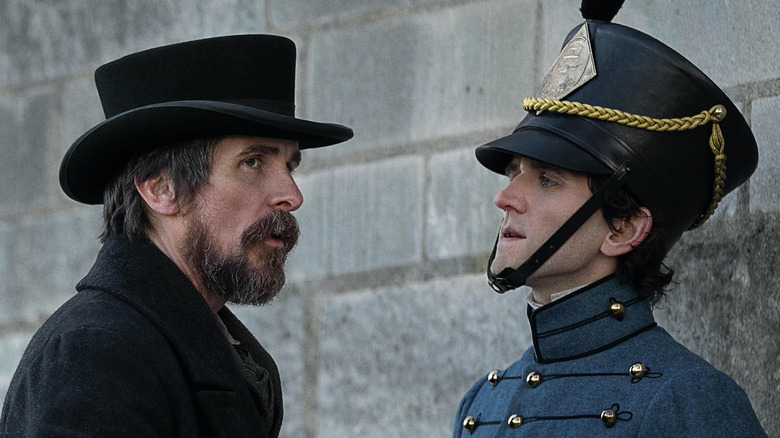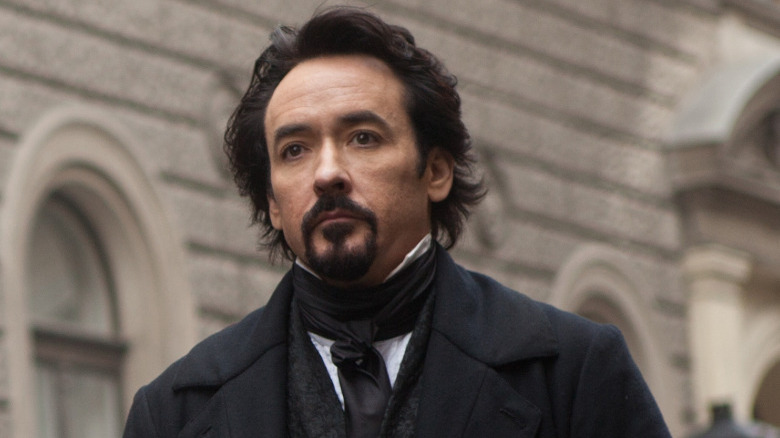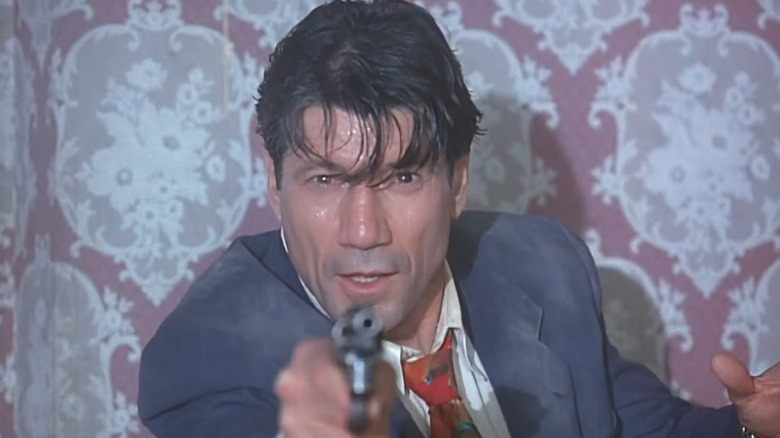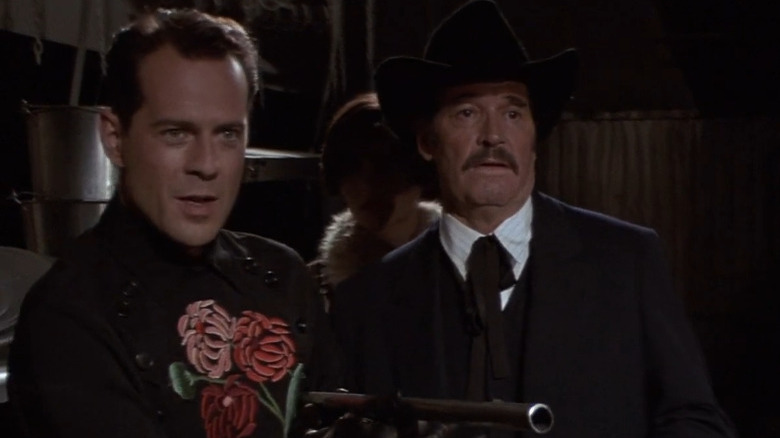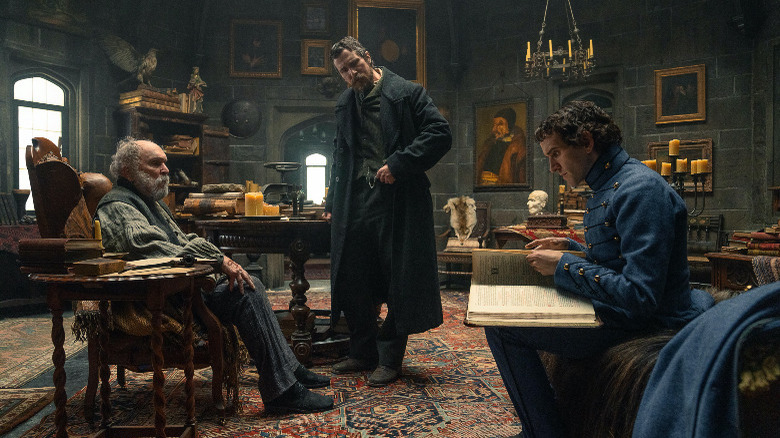The Pale Blue Eye Showcases One Of Hollywood's Most Peculiar Crime Story Obsessions
Motion pictures, for better or worse, shape the way that we view history. They bring the past to life using realistic costumes, production design, and visual effects. They tell vivid stories about real-life figures and important events that shaped the world around us to this day, and which provide meaningful parallels to the lives we currently lead.
And yet, if the movies have taught us anything, it's that every single historical figure, at some point in their storied life, has also solved at least one murder mystery. Or at least they fought a mummy or something. The desire to tell tales of historical fiction is perfectly understandable, but our collective and very specific urge to transform biographies into pulpy fan fiction is a little weird, if you think about it.
Consider, if you will, Scott Cooper's "The Pale Blue Eye," which co-stars Harry Melling as a young Edgar Allan Poe, the future author of horror classics like "The Tell-Tale Heart" and "The Pit and Pendulum." Poe arguably invented the detective genre as we know it with "The Murders at the Rue Morgue," a story about a brilliant investigator solving strange murder mysteries about a half-century before Sherlock Holmes saw print. Poe may have been a real person with an incredible, actual resumé, but apparently his life story is only worth green-lighting if he's a daring do-gooder fighting crimes that directly reference his most popular tales.
We know this because "The Pale Blue Eye" isn't even the first film to recast Edgar Allan Poe as a detective. It's at least the fourth.
Raven images
Although several straightforward biographical films have been made about Edgar Allan Poe, including multiple ones in the silent era, there's a curiously long history of putting him at the center of his own morbid tales of criminality and horror. The trend goes at least as far back as the 1951 thriller "The Man with a Cloak," which starred Joseph Cotten as an alcoholic poet who gets roped into a murderous inheritance scheme. His character may be called "Dupin" but that's also the name of Poe's detective character, and not for nothing, this guy looks just like Edgar Allan Poe. (The twist at the end of the movie is — I hope you're sitting down for this — he's actually Edgar Allan Poe.)
Although "The Man with a Cloak" is relatively obscure now, its cast is still rather famous. In addition to Cotten, who starred or co-starred in classics like "Citizen Kane" and "The Third Man," the film boasts performances from Barbra Stanwyck ("Double Indemnity"), Leslie Caron ("An American in Paris") and even Mr. Magoo himself, Jim Bacchus.
In more recent years that have been a slew of murder mysteries about Edgar Allan Poe, including James McTeigue's "The Raven," which starred John Cusack as the famous author, who is enlisted to help solve a series of murders inspired by his most gruesome tales. And then in 2022, in addition to "The Pale Blue Eye," there was "Raven's Hollow," a Shudder exclusive in which — just like in the Scott Cooper film — a young Edgar Allan Poe has to solve a murder mystery while he's still a cadet at West Point.
Hell is author people
It makes a certain degree of sense to place Edgar Allan Poe within the context of his own stories, and since his own stories were often in genres that are still popular and lucrative, all the better. Poe solving crimes not unlike his famous tales of murder and the macabre is a good pitch, even if it is kinda weird that at least four unrelated movies have gone with that same, very specific pitch.
But the phenomenon is in no way limited to Poe, and sometimes it makes sense. For example, The Brothers Grimm compiled a series of fairy tales that made them a household name, so placing them inside a fairy tale themselves — in Terry Gilliam's "The Brothers Grimm," starring Matt Damon and Heath Ledger — was a bit of a no-brainer.
Then, of course, there's influential author H.P. Lovecraft, who wrote bizarre and often very racist tales of cosmic horror. In the HBO movie "Cast a Deadly Spell," Lovecraft found himself completely reimagined as a private detective solving supernatural crimes in an alternate history Los Angeles, where magic is real and monsters walk the streets instead of skulking in the shadows. Directed by future "GoldenEye" and "Casino Royale" filmmaker Martin Campbell, and starring Fred Ward and Julianne Moore, the film was popular enough to yield a sequel set in the 1950s, with Dennis Hopper taking over the role of Lovecraft. The film was called "Witch Hunt," and it reframes the red scare as — you guessed it — a literal witch hunt.
Fiction is stranger than truth
But wait! There's also Blake Edwards' largely forgotten Hollywood mystery film "Sunset," which starred James Garner as Wyatt Earp and Bruce Willis as famous movie cowboy Tom Mix. It's true that Earp worked in Hollywood in his later years, as a technical consultant on westerns, but he probably never teamed up with a movie star to solve a murder, which is exactly what happens in "Sunset."
And who can forget "Time After Time," the film in which "The Time Machine" author H.G. Wells builds a real-life time machine, only to have it stolen by Jack the Ripper, who escapes into the 1970s? Directed by future "Star Trek II: The Wrath of Khan" filmmaker Nicholas Meyer, the film stars Malcolm McDowell as Wells and David Warner as Jack the Ripper, in a clever but very odd piece of historical fan fiction. And then, of course, Elvis Presley faked his death and fought a mummy in a retirement home alongside a man who had John F. Kennedy's brain transplanted into his body in Don Coscarelli's "Bubba Ho-Tep," which stars Bruce Campbell and Ossie Davis and has to be seen to be believed.
Speaking of monster fighting, Abraham Lincoln himself hunted vampires in the would-be blockbuster release, "Abraham Lincoln: Vampire Hunter," which is actually pretty funny because Abraham Lincoln literally did help solve crimes when he was a lawyer, prior to becoming a politician. (Those events were dramatized in John Ford's Oscar-nominated 1939 biopic "Young Mr. Lincoln," starring Henry Fonda.) The urge to fictionalize a real person's life to become more like a pulpy movie was so overwhelming, it overpowered the actual parts of that person's life which were like a pulpy movie.
The truth is, we like fiction
History is interesting but it looks a heck of a lot like homework, so while people may be interested in historical figures they don't always want to learn about them in detail. Sometimes we just want to revel in the iconography of history, the allegorical representations of well-known figures, and place them in comforting contexts.
Edgar Allan Poe was a brilliant writer and a tortured soul, and since he wrote about scary and murderous things, placing his real-life story in a scary or criminal context feels vaguely appropriate, even if it's arguably not very respectful. This along with the fantasy that every writer's inspirations are very much literal, and can easily be dramatized and filmed, makes for amusing if not entirely accurate storytelling.
Then again, maybe Hollywood's odd tendency to transform the lives of historical figures into pulp genre tales has a lot less to do with history and a lot more to do with the fact that audiences just like genre stories. Movies and television shows and novels about crime fighters sell incredibly well, so the need for new takes and intriguing gimmicks to make those stories feel fresh is very powerful. Taking a real-life person audiences have heard of and putting them in a sci-fi/horror/detective story context is, on a practical level, a marketable selling point.
But even with that being said, and perhaps being undeniable, it does speak to our continued fascination with our past that we want to keep it alive in storytelling fashions that speak to us today. We want to keep icons like Poe alive in our fiction, not just his, and that means sometimes he has to fight a supernatural raven monster, or at least investigate a corpse mutilation or two.
"The Pale Blue Eye" will begin playing in select theaters on December 23, 2022. It will stream on Netflix starting January 6, 2023.
